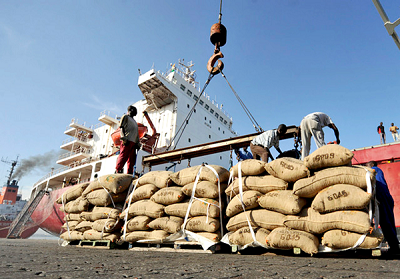EU will not ban cocoa beans exports from Ghana – Ambassador Irchad Razaarly
EU Ambassador to Ghana, Irchad Razaarly, has dismissed reports that Ghana’s cocoa will be banned by members of the Union.
This was made known by the Director at the EU Office in Ghana, Celine Madsen Prud’homme, in a speech read on behalf of Ambassador Irchad Razaarly.
According to her, cocoa from Ghana and Côte d’Ivoire meet requirements from the EU.
“As my ambassador said earlier, there will be no ban. All countries considered high risk will be able to continue selling their products in the EU market provided producers can demonstrate that products are legal and free from deforestation”.
“There is no ban on Ghana’s cocoa. On the contrary, we want more of Ghana’s cocoa, and we are in support of Ghana and Côte d’Ivoire amongst all of the producers who meet these requirements”, she added.
Her comments follows some assertions made by the Information Minister, Kojo Oppong, that Ghana’s Embassy in Belgium under the leadership of Ambassador Sena Boateng, has brought to the attention of the Government of Ghana that Europe via a new legislation could soon make Ghanaian cocoa and coffee not exportable to many international markets.
This is due to the destruction of cocoa lands by illegal mining activities, as there are fears that the activities of the illegal miners may poison some cocoa beans.
Meanwhile, the Ministry of Lands and Natural Resources is enforcing the Joint Framework for Action, signed in 2017 with 36 cocoa and chocolate producing companies, to halt deforestation and degradation of the forest in the cocoa value chain.
This is under the Cocoa and Forests Initiative to ensure cocoa lands are not taken over for illegal mining activities.
Speaking at the 2022 Orange Cocoa Day, the Sector Minister, Samuel Abu Jinapor, said government is stepping up education and sensitisation, urging traditional and local authorities, farmers and members of the local community, to rally behind the government
“It is disheartening, that while we are taking all these measures, people are selling their cocoa farms to illegal miners without thinking about the long-term effect of their actions on the environment. This is a matter we must deal with, which we are fully committed to. But we need the cooperation of all”, he explained.
Cocoa: Help African countries achieve sustainability standards in new legislation – Oppong Nkrumah tells EU
Meanwhile, Minister of Information, Kojo Oppong Nkrumah, has said the EU must work with African, Carribbean and Pacific (ACP) countries in achieving the new sustainability standards set for the purchases of cocoa and coffee from Ghana as that risks putting players within the value chains out of business.
Speaking at the “Alliances in Ghana: Coffee and Chocolate at the table”, organized by the International Trade Centre (ITC) and the Ghanaian Mission in Brussels last week, Mr Oppong Nkrumah urged the European Union (EU) to work with African, Caribbean and Pacific (ACP) countries to prevent its proposed ethical and sustainable supply chain rules from becoming a burden for the local cocoa and coffee industry.
“At a time where farmlands are coming under threats for competing and more rewarding economic activities, sustainability is a matter that requires some more attention. By no means however should sustainability be used as a pretext to limit market accessibility.
“Exchange of best practices and technical assistance is necessary so that we can have a win-win situation in all of this.
“Farmers deserve a recompense for their hard work and should not be left out in any business or policy negotiation. Their social reality and cultural context must be considered when designing legislation so they may meet their demands and not bear a disproportionate burden for complying with the regulation,” he said.
EU lawmakers have backed a proposal for a law that will ban the sale of agriculture products linked to the destruction of forests, and human rights violations.
The bill was supported by 453 votes, to 57 with 123 abstentions. The EU Parliament will now start negotiations on the final text with EU member states.
Once approved, the law would force companies and producers to give assurances that products are deforestation-free and meets EU’s sustainability standards.
Businesses will be forced to verify that agricultural goods sold in the EU have not been made on deforested or degraded land anywhere in the world.
This, Nkrumah said could soon make Ghanaian cocoa and coffee unexportable to many international markets within the 27-nation bloc.
He said Ghana must act quickly to ensure the two industries meet the interests of European markets else millions of households and the economy in general could be significantly affected by this proposed legislation.








